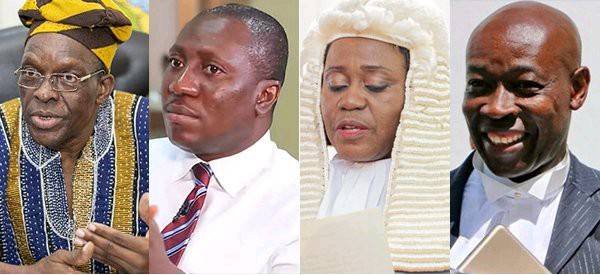Â
Thaddeus Sory, legal counsel for Speaker of Parliament Alban Bagbin, has responded to the recent Supreme Court ruling that overturned the declaration of four parliamentary seats as vacant. Sory insists the ruling gave no explicit directives to compel the Speaker to recognize the affected MPs. This position leaves Alexander Afenyo-Markin, his legal team, and the Akufo-Addo-led government grappling with the political and legal implications of the judgment.
With less than a month to Ghana’s presidential and parliamentary elections, the deadlock between Speaker Bagbin and the New Patriotic Party (NPP) caucus persists, threatening legislative progress, including the approval of the 2025 budget. Most MPs are currently campaigning for reelection, compounding the parliamentary gridlock.
On November 14, the Supreme Court issued its full judgment, clarifying that an MP's seat can only be declared vacant if they officially switch their political affiliation and continue to serve under a new party while in Parliament. The ruling followed a suit by Afenyo-Markin, which challenged Bagbin's declaration of the seats as vacant. The court ruled in a 5-2 majority that the Speaker’s actions were unconstitutional, effectively restoring the affected MPs to their positions and reaffirming the NPP’s majority in Parliament.
The four MPs—Cynthia Mamle Morrison (Agona West), Kwadjo Asante (Suhum), Peter Kwakye-Ackah (Amenfi Central), and Andrew Amoako Asiamah—had declared their intent to contest the December elections under different party tickets, prompting Bagbin to invoke Articles 97(1)(g) and (h) of the 1992 Constitution to declare their seats vacant. The court, however, ruled that these constitutional provisions only apply to an MP's current term and not to future electoral ambitions.
Justice William Atuguba, a retired Supreme Court judge, has cautioned Bagbin against disregarding the ruling, warning of potential contempt charges. He emphasized that the Speaker is bound by the court’s decision and risks legal consequences if he refuses to recognize the reinstated MPs. Justice Atuguba noted that noncompliance could lead to imprisonment of up to 10 years, disqualification from holding public office, or removal from the Speakership.
Despite these warnings, Sory maintains that the Supreme Court’s ruling did not contain any direct orders requiring Parliament to reinstate the MPs. He argues that the stay of execution on Bagbin’s initial declaration has been rendered moot and that no fresh directive compels the Speaker to act otherwise. In a detailed statement, Sory questioned the court’s jurisdiction, asserting that the original case filed by Afenyo-Markin did not cover subsequent developments, such as Bagbin’s public statements. Sory argued that these developments were addressed through an ex parte application rather than a formal amendment to the case.
Justice Darko Asare, who authored the lead judgment, acknowledged that the Speaker’s statements occurred after the case was filed. However, the majority justified their jurisdiction by citing an "intimate connection" between the Speaker’s statements and the constitutional issues raised. Despite their disagreements with Bagbin's interpretation of Articles 97(1)(g) and (h), the majority refrained from declaring the Speaker’s actions null and void or issuing specific enforcement orders.
Legal experts and political commentators remain divided on the matter. Martin Kpebu, a constitutional lawyer, has urged Bagbin to challenge the ruling to assert Parliament's independence and strengthen Ghana's democracy. Kpebu believes a pushback from the Speaker could highlight concerns about judicial overreach and the need for constitutional reforms. He criticized the judiciary's perceived alignment with the executive, arguing that such dynamics undermine the balance of power.
Veteran journalist Kwesi Pratt Jnr has also weighed in, expressing skepticism that the Supreme Court ruling will resolve the parliamentary deadlock. Speaking on Peace FM, he stressed the importance of negotiation and consensus-building within Parliament. According to Pratt, judicial interventions alone cannot address deep-seated political conflicts, citing the unresolved tensions in Bawku as an example.
Former Chief of Staff Kwadwo Mpiani has called for internal resolution of parliamentary disputes, cautioning against frequent judicial intervention. Mpiani argued that resorting to the courts for parliamentary issues disrupts legislative processes and sets a dangerous precedent. He urged Bagbin and MPs to prioritize constructive dialogue and cooperation.
The parliamentary impasse poses significant risks to Ghana's governance. With key legislative decisions, such as the 2025 budget, hanging in the balance, stakeholders are calling for decisive leadership and collaboration. The unresolved tensions underscore the broader challenges of balancing constitutional interpretation, parliamentary autonomy, and political partisanship in Ghana's democratic framework.
As the situation unfolds, Bagbin’s next moves will be closely watched, particularly as the nation approaches a critical election period. Whether through judicial compliance or strategic resistance, the Speaker's actions could have lasting implications for Ghana's parliamentary and constitutional order.




No comments yet
Be the first to share your thoughts!